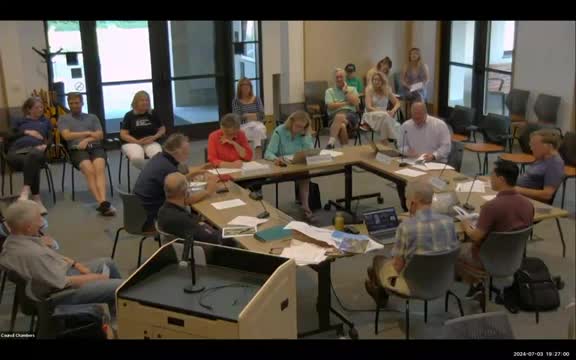Community Demands Inclusive Playground Design for All Abilities
July 05, 2024 | Atherton Town, San Mateo County, California

This article was created by AI summarizing key points discussed. AI makes mistakes, so for full details and context, please refer to the video of the full meeting. Please report any errors so we can fix them. Report an error »

During a recent government meeting in Atherton, community members expressed strong concerns regarding the accessibility of a proposed playground design at Holbrook Palmer Park. The discussions highlighted a significant gap in inclusivity for children with disabilities, prompting calls for a more comprehensive approach to the playground's design.
One resident, who shared insights from his fiancée—a special education teacher—voiced disappointment over the current design's lack of accessibility features. He questioned whether the design met even basic standards for inclusivity, suggesting it fell short of what children with disabilities would need to fully enjoy the space. This sentiment was echoed by several other attendees, who emphasized the importance of creating a playground that accommodates all children, regardless of their abilities.
Scott, a representative involved in the design process, acknowledged that the initial survey conducted did not prioritize universal accessibility, which led to the current design's limitations. He explained that the feedback received from the community had not emphasized the need for features like wheelchair swings or other adaptive equipment. The budget constraints were also noted, with the cost of certain materials significantly higher than alternatives, which further complicated the design process.
Community members, including parents of children with disabilities, passionately advocated for the inclusion of the Magical Bridge Foundation, known for its expertise in creating fully accessible playgrounds. They highlighted the positive impact such spaces have on fostering interaction among children of varying abilities, promoting inclusivity and understanding within the community.
Katie Peck, a resident and grandmother of a child with autism, shared her experiences at a Magical Bridge playground in Palo Alto, noting how it allowed children of all abilities to play together for the first time. Other parents echoed her sentiments, stressing that inclusive playgrounds are not just beneficial for children with disabilities but enrich the community as a whole.
The meeting concluded with a consensus on the need for a revised design that prioritizes accessibility and inclusivity. Attendees urged the town council to consider inviting the Magical Bridge Foundation to present a new proposal, emphasizing that true inclusivity goes beyond mere compliance with regulations—it requires thoughtful design that welcomes all families.
One resident, who shared insights from his fiancée—a special education teacher—voiced disappointment over the current design's lack of accessibility features. He questioned whether the design met even basic standards for inclusivity, suggesting it fell short of what children with disabilities would need to fully enjoy the space. This sentiment was echoed by several other attendees, who emphasized the importance of creating a playground that accommodates all children, regardless of their abilities.
Scott, a representative involved in the design process, acknowledged that the initial survey conducted did not prioritize universal accessibility, which led to the current design's limitations. He explained that the feedback received from the community had not emphasized the need for features like wheelchair swings or other adaptive equipment. The budget constraints were also noted, with the cost of certain materials significantly higher than alternatives, which further complicated the design process.
Community members, including parents of children with disabilities, passionately advocated for the inclusion of the Magical Bridge Foundation, known for its expertise in creating fully accessible playgrounds. They highlighted the positive impact such spaces have on fostering interaction among children of varying abilities, promoting inclusivity and understanding within the community.
Katie Peck, a resident and grandmother of a child with autism, shared her experiences at a Magical Bridge playground in Palo Alto, noting how it allowed children of all abilities to play together for the first time. Other parents echoed her sentiments, stressing that inclusive playgrounds are not just beneficial for children with disabilities but enrich the community as a whole.
The meeting concluded with a consensus on the need for a revised design that prioritizes accessibility and inclusivity. Attendees urged the town council to consider inviting the Magical Bridge Foundation to present a new proposal, emphasizing that true inclusivity goes beyond mere compliance with regulations—it requires thoughtful design that welcomes all families.
View full meeting
This article is based on a recent meeting—watch the full video and explore the complete transcript for deeper insights into the discussion.
View full meeting
